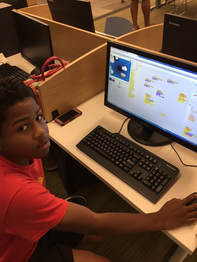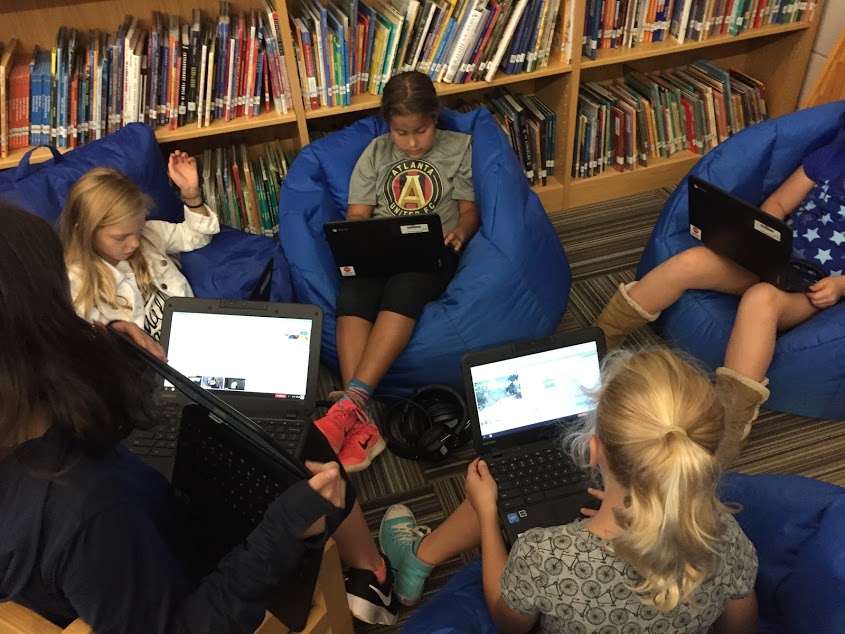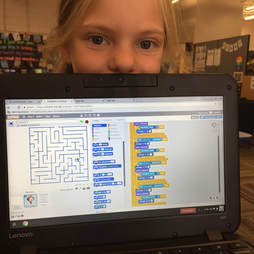|
The Nerd Ninjaz are coordinating an Hour of Code with two elementary schools in Southeast Atlanta, Barak & Michelle Obama Academy and Benteen Elementary, on December 4, 5, & 6, 2017. Anyone and any company passionate about computer science education and careers in tech can be a volunteer. We want volunteers of all ages, backgrounds, and experience levels who have a passion for increasing diversity in tech. The Hour of Code has a large variety of tutorials for all ages and skill levels so you don’t need to be an expert to volunteer! Who To Contact?
 This fall I’ve been gearing up to do some special things with the Nerd Ninjaz. Fall is the time of year where new programs begin and new faces join the Nerd NInjaz. It’s always exciting to walk into that first day in the Dojo. This Fall I refreshed what we do to better engage our Ninjaz and raise the bar for projects and sharing. I’ve been at The Study Hall and Atlanta Neighborhood Charter School (ANCS) and The Study Hall for nearly three years working with 2nd - 5th grade Ninjaz. At The Study Hall, we have created digital avatars for 10 Ninjaz that they will incorporate into a Scratch animated short story. At ANCS the current Dojo of 20 has several new faces and some veterans as well. One group of young ladies, Steak46, Sushidog, Mugino, and others is knocking it out of the box with mazes, animations, and puzzles. A group of 3rd grade boys, Burp49, lionking9, sosha2, and others, have formed their own studio and each week add a new game that they have made. I launched a Family Code Night at the Metropolitan Branch Public Library in Southwest Atlanta. I have wanted to get more active in communities in Southwest Atlanta. I’ve hosted two (2) Family Code Nights and will have two more sessions, November 15 and December 12. These are great opportunities to come out and learn about coding Nerd Ninjaz. The young man to the left came and completed his first project at our second night. I want to reach more youth in Southwest Atlanta by having a Code Dojo at a location near families starting in January. We have worked with over 1,000 young people in the nearly two years we have been in operation, with nearly a dozen (12) organizations that are our client partners. But we can do much more and reach many more. I’m looking for fresh ideas and even partners who believe that every child can learn to code. Please share your ideas on:
Your ideas, comments, and suggestions are needed to help us get to the next level. I'm looking forward to the beginning of a great community effort. William Teasley Nerd Ninja Sensei T: @WilliamHGEI I started Soar with the hypothesis that Metro Atlanta has talented high performing students, many first generation and low-income, that were not connecting to peer institutions that could alter the trajectory of their lives and future. In the Spring of 2014, the Soar team met with nearly 100 students that attended 5 different high schools in Atlanta, Gwinnett, and DeKalb, and several after school programs. This was the first introduction for many to private liberal arts colleges, especially colleges in places many had never heard of before, like Claremont, CA, Colorado Springs, CO, or Poughkeepsie, NY. Soar provided a door to another type of collegiate experience and journey they could take, if accepted, at liberal arts colleges like Amherst, Pomona, or Swarthmore.
The colleges were approached because they offer a suite of support services available for students that have ethnic, financial, first generation, cultural, or social disadvantages. Soar colleges stood out because they were highly competitive but had made more than a verbal commitment to increase diversity on their campuses. These colleges meet up to 100% of a student’s financial need, several with no loans included in the financial aid package. To a student from Southeast Atlanta or Southwest DeKalb with little money, the right financial aid package is the difference between going to college or not. They also provide a trust based environment that has no boundaries on how far you can take your ideas, passions, and learning. An advantage that Soar colleges offer Atlanta’s students that we work with is the look at the whole student in the application process. ACT/SAT scores are considered but not a primary factor in acceptance decisions. This overcomes Soar student’s second greatest concern after money, their ACT/SAT scores, which disadvantaged and African American youth have historically underperformed their more affluent and White peers. Their entire body of work, that includes classes, grades, extracurriculars, and essays matter more than the ACT/SAT scores. Pitzer College is test optional and doesn’t require students to send test scores. Students really are more than a score at these colleges. Soar’s typical students have been impacted and supported by their school counselors, College Advising Corps, Project GRAD, Communities In Schools of Atlanta, GSU Early College, and others that have their future in mind. Soar students opt-in, which is they choose to participate if our colleges meet their individual needs for financial aid, location, networking/internships, and diverse academic opportunities. Soar adds capacity to these organizations to mentor those students that are college bound to fully explore all the paths that could alter their future trajectory. In the Fall of 2014, our first two students ventured to Amherst College and Pitzer College, both receiving over $57,000 each in annual financial aid from the colleges plus an additional $5,500 from Pell. The 20 new seniors we are working with who will walk onto college campuses in the Fall of 2015 have overcome much, just like their predecessors. All have faced some challenge that would break many; bullying, death, abuse, neglect, sexual assault, poverty, abandonment, feeling voiceless, immigration challenges, parent incarceration, depression, and/or homelessness with many experiencing a combination of these. But despite all that, their eyes, hearts, and minds are focused on a future that will benefit themselves and those around them. Soar assumed the role of guiding them to paths that could take them beyond what they’ve imagined. Another characteristic of Soar’ students is that they are unfortunately not selected by Posse, Gates, Coca Cola, or Questbridge. They are in the top 20% of their class and maintains an 85.00 gpa or higher. Many were semifinalist and even a few were finalist in these programs, but were not selected. The lack of selection was not an indication of their capability but the preferences of the individuals and organizations doing the selecting. It was always hard for me to see so many talented young people not get that chance that could change their lives in ways unimaginable. Soar is an additional pathway for Atlanta’s talented students to follow, in concert with other efforts, to reach beyond their dreams. I have had an ulterior motive in all of this. First was to be a mentor as I was mentored when I was their age. Secondly, it was to go one step beyond college by preparing leaders that can navigate the halls of influence for tomorrow. Young leaders that are guided by the heart and mind. Future professionals who will become senators and congressional representatives that make and change laws that insure the doors they passed through will always be open to those coming behind them. I look forward to seeing Terriyonna, Naajia, and the ones that come after them walk across the stage to receive their diplomas, acknowledged as Fulbright, Rhodes, and other scholars. I look forward to when they are unleashed on an constantly changing world that is in need of a new breed of change makers. Recently one young man asked me what Soar stood for, expecting some acronym attached to each letter. I shared the Webster Dictionary definition - to ascend to a higher or more exalted level as what we stand for. Soar’s mentors Atlanta’s talented and high performing students take off to reach higher and more exalted levels. In 2015, we hope to guide even more to reach their maximum potential. William H. Teasley, Director An interesting thing is happening all across the country, first generation and low-income students are…. not completing the college access process. Often referred to as “Summer Melt” many of these students have been accepted by colleges or are only a few points away on the Compass Exam/ACT/SAT from crossing into the ivory halls. Yet mysteriously many of these students will not end up in a college class this fall, not because of ability but because of a something I call Collegiaphobia.
Working with young adults preparing for another chapter in the academic careers has provided me with an opportunity to see students of different abilities, backgrounds, and fall victim to this little known fear. What is common, however, is that this afflicts quite a few low-income, first generation, and minority students more so than those who are high-income, multi-generational, and majority students. However, it can be felt in communities across cities like Atlanta, Chicago, Charlotte, Nashville, and others where there are communities where a college going culture has not taken root because poverty and simply keeping the lights on is a priority. Recently two students in Atlanta, that myself and a fellow professional had provided college access assistance to, asked for assistance to enroll into their final college option (they only applied to three colleges whereas I recommend 10). These students never created a list of ten colleges or realistic looked beyond their comfort zone (stay close to home). There were B students with the tools to be successful in college and eligible for grants/scholarships to decrease the cost of their college journey. But when I asked if they took the ACT/SAT and then ask about their scores, I hear the beginning words of fear, which are “I didn’t really study …”. Having assisted them in finding prep classes and signing up for questions of the day, my response is “You know the word test is in the name right?” It is a challenge to engage the young adult in a candid discussion about something they know and understand as they have taken plenty of tests in their academic lives up to now. They know that preparation and study can help them get the best grade possible. However, the moment they sign up for the test their battle with their fear begins. From there it escalates to missed deadlines, lack of desire to complete applications, frustration with the process itself, resistance to preparation, blaming others in the process, and the fear of standardized anything. “Summer Melt” is described as a phenomenon that affects low-income, first generation students in the summer before college. However, it is my position that “Summer Melt” is the culmination of the fears that began when they registered for their first highest stakes standardized test for college. Self-doubt of ones abilities, fear of the unknown, fear of walking down a path alone, fear of personal growth, fear of losing acceptance, fear of loss, and fear of rejection occur for several young people along the college access path. Summer Melt is when the student faces the real prospect of change and growth, that the fears overwhelm them and causes them to avoid the college entrance process. These fears can be overcome but many times their combined weight claims another victim. Then there are those ready to move on, they are the ones who can’t wait for the plane/bus ticket to arrive or get the car packed up for the trip for their next academic and personal adventure. These are the ones where college wasn’t an option or it was their ticket to a different trajectory in life. They are not without similar fears that manifest themselves in diverse ways but have developed the ability to accept their fears, which emboldens them to move beyond them. When they all walk through the doors the first time as a student of an institution of higher education, they overcome much that is not merely physical but psychological. Faces light up as they embark on a new journey with new possibilities. However, those fears are only dormant a may rise again to create challenges of persistence and completion that the young people have not developed the tools to address. We must recognize that Collegiaphobia is real and that it is time for colleges and the college access community to recognize it. William Teasley, HGEI |
AuthorSA blog for those working to refine the college access pipeline, create more opportunities to nurture future change agents, and mitigate the gaps. Archives
September 2020
Categories |



 RSS Feed
RSS Feed
